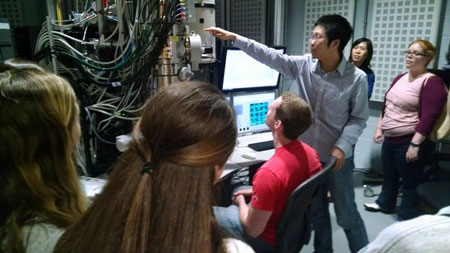| Posted: Sep 16, 2015 |
NSF-funded network set to help businesses, educators pursue nanotechnology innovation
(Nanowerk News) NC State University, Duke University and UNC-Chapel Hill are launching a partnership to give businesses and educators access to expertise and facilities that will speed the development of new nanotechnology-based products and educational opportunities. The partnership, called the Research Triangle Nanotechnology Network (RTNN), is led by NC State and is supported by a five-year, $5.5 million grant from the National Science Foundation.
|
|
“The grant will fund efforts to open our doors and work more effectively with the public, from major corporations and start-ups to community colleges and K-12 educators,” says Jacob Jones, a professor of materials science and engineering at NC State and principal investigator of the grant.
|
 |
| Students and researchers in NC State's Analytical Instrumentation Facility.
|
|
The bulk of the funding will be used to hire staff who will be dedicated to reaching out to potential industry and educational partners to identify ways that RTNN can address their specific needs.
|
|
“For businesses, our goal is to help them develop new products, improve existing ones, and help them move discoveries to market,” Jones says. “For educators, we want to introduce them to nanotechnology and give them resources they can use in the classroom.” The RTNN will also make laboratories and entrepreneurs better at what they do. David Berube, a professor of communication at NC State and lead of the social science component of the grant says, “We hope that this will allow us to develop best practices that can be used to ensure that future partnerships for innovation will be successful.”
|
|
And RTNN has a variety of resources that they’ll be using to help achieve those goals.
|
|
“NC State has an enormous amount of expertise in nanotech-related fields, from agriculture and plant biology to textiles and materials science and electrical engineering,” Jones says. “And across all three universities, our expertise touches on almost any area of nanotechnology you can think of. So, regardless of the challenges a corporation or entrepreneur may be facing, we will be in a position to connect them with relevant subject matter experts.”
|
|
In addition to providing expertise, it will also give the public access to a wide array of powerful tools to help them advance their innovations from concept to prototype and, ultimately, through manufacturing for the marketplace.
|
|
For example, NC State’s Analytical Instrumentation Facility has the ability to look at the structure of nanoparticles in three dimensions and the individual positions of atoms in a nano-device. The latter is done using a technique pioneered at NC State called “revolving STEM” and a state-of-the-art aberration-corrected scanning transmission electron microscope.
|
|
“This will be used to help develop and fine-tune technologies in fields from drug delivery to water purification to nanoelectronic devices,” Jones says.
|
|
Between NC State, Duke and UNC-Chapel Hill, RTNN has a suite of other facilities that will also be valuable to outside groups. These facilities have capacities including nanofabrication of electronics, textiles fabrication and characterization, sophisticated materials characterization, and labs that evaluate interactions between nanotechnologies and the environment.
|

